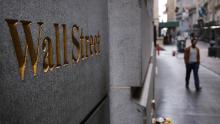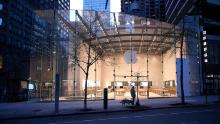America is in turmoil and stocks are booming. Is the market broken?
The S&P 500 closed Tuesday at the highest level in nearly three months. The Nasdaq has spiked 40% since March 23, fueled by the resilience of Big Tech, and is now within striking distance of all-time highs.
There are two major reasons for this: unprecedented stimulus from the Federal Reserve, and investors not wanting to miss out on monster returns once the economy recovers.
Joe Brusuelas, chief economist at RSM International, said he can’t recall a time when the disconnect between Wall Street and the real economy was this great. He blamed in part the sharp decline in the number of public companies in the United States.
“The market is broken. It no longer reflects a forward outlook that is truly aligned in the real economy,” he said. “That’s a problem because at some point, the public will say these markets are rigged.
Robert Shiller, the Nobel Prize-winning economist, told CNN Business that this backdrop of rising risks and surging stock prices leaves the equity market “vulnerable” to a setback.
“I don’t think standard economic models are much good at forecasting right now,” Shiller said.
Ferocious Fed response masks economic turmoil
One reason Wall Street continues to celebrate, despite the turmoil taking place in its city and others, is the forceful economic rescue mounted by the federal government.
The Fed response, led by Chairman Jerome Powell, has worked wonders at revitalizing financial markets that seized up just three months ago. And Powell has vowed to do more, if necessary.
“There is a very, very significant Powell Put under stocks right now,” said Kristina Hooper, chief global market strategist at Invesco.
That means that while Main Street is still grappling with coronavirus, racial crisis and the impacts of both, Wall Street is doing just fine. Fed policy has allowed markets to decouple from economic reality.
The FOMO factor
It’s also normal for markets to sniff out recoveries long before average Americans feel them. That’s what happened when US stocks bottomed in March 2009, even though the economy was still in shambles. That began the longest bull market in American history.
There are some faint signs that the current economy is bottoming. For instance, the number of unemployment claims has gradually declined, and mortgage applications are rising. Airline passenger activity is climbing as well.
Shiller, the author of “Irrational Exuberance,” said many investors have FOMO, or fear of missing out, because they didn’t participate in the last bull market: “They remember not catching it last time.”
And then there’s the impact of Trump’s public confidence in the economy’s ability to rebound rapidly.
“Donald Trump encourages a sort of self-confidence. You don’t have to believe Trump — you only have to believe that other people believe Trump,” said Shiller.
How will the economy be affected?
“It’s going to be a depressant. It will slow the trajectory of the reopening in the short term,” said Danielle DiMartino Booth, CEO and chief strategist at Quill Intelligence. “If this persists, it will add a whole new level of uncertainty.”
It’s too early to know whether the unrest will worsen the pandemic. Although some protesters are wearing masks, many others are not.
“We have to worry about the potential for a resurgence in infections. Any one of these protests could be a super-spreader event,” said Hooper.
‘People are angry’
The divide between rich and poor was worsened by the Great Recession and its aftermath. The US government’s response relied heavily on easy money from the Fed, rather than the kind of fiscal stimulus that can help lower-income Americans.
“The policies used to get out of the great financial crisis exacerbated wealth inequality,” said Invesco’s Hooper.
Extreme inequality isn’t just a social issue. It could become a problem for Wall Street.
Unrest could amplify the divide even further
A similar story is playing out today.
Secondly, the decoupling of the stock market from the real economy is amplifying inequality because many poorer Americans have little to no exposure to stocks.
“They’re not benefiting from the rise of Amazon and Microsoft. They live in a completely different world,” said Brusuelas.
And then there’s the civil unrest, which doesn’t just reflect inequality. In an economic sense, it could have the unfortunate side effect of making the divide even worse.
Lower-income communities have been hit hard by riots, looting and vandalism. It can take years for less affluent neighborhoods and small businesses, many of which were already hurting from the pandemic, to recover from the damage.
“This will exacerbate the divide,” said Booth. “Two weeks of delayed reopening won’t affect Target or Walmart. But for small businesses barely holding on, it could make the difference between life and death.”


